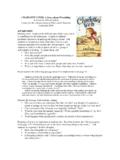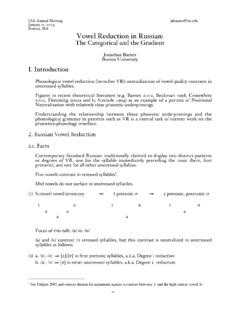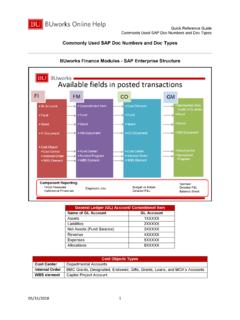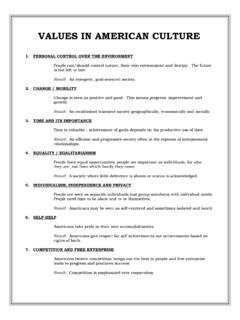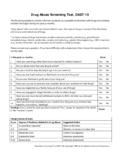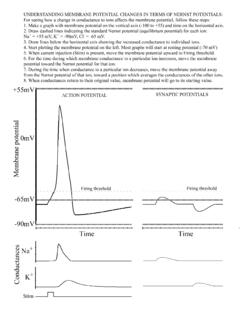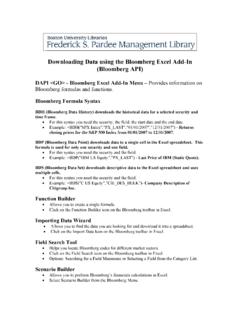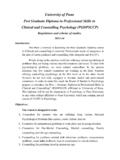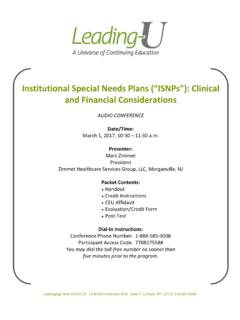Transcription of BOSTON UNIVERSITY SCHOOL OF SOCIAL WORK
1 1 BOSTON UNIVERSITY SCHOOL OF SOCIAL work Human Behavior in the SOCIAL Environment HB 720 Fall 2009 COURSE DESCRIPTION Human Behavior in the SOCIAL Environment (HBSE) is designed to help you chart a knowledgeable course through the complexity of human experience. We will explore a select set of theories that help us understand how individuals and communities develop and interact. Because empathic and skillful interventions with individuals, groups, and communities require understanding ourselves as well as others, the course provides an opportunity for increased self-awareness. At the beginning of the course, we focus on the key theories that help us understand the dimensions and expression of human behavior in the SOCIAL environment. This discussion is followed by an examination of how dimensions of culture and cultural contexts can shape individual values, beliefs worldviews and identities and therefore play a role in the helping process.
2 Through discussion and analysis, we will explore areas of universality and difference in the context of gender, race, ethnicity, sexual orientation, spiritual beliefs, and socioeconomic class, as well as the realities and influence of multiple forms of oppression. Finally, we will examine human development throughout the lifespan, considering the developmental scientific knowledge base regarding opportunities and vulnerabilities present during the different stages of the lifecycle and the biopsychosocial and cultural factors that can influence individual development. The ability to analyze human behavior in the SOCIAL environment is essential for all methods of SOCIAL work practice, whether the primary focus is clinical or macro. HB 720 constitutes the foundation course in the human behavior department and is the underpinning of all courses in the HBSE sequence.
3 Joseph Merighi, MSW, PhD Chairperson, Human Behavior Department 264 Bay State Road | BOSTON , MA 02446 617-353-7914 2 The goal of the course is to enable students to develop a culturally competent framework for analyzing human behavior in order to create empathic, empowering relationships with individuals, families, groups, organizations, and communities. SOCIAL work theory and practice has a unique perspective that articulates the interconnection between an individual and his or her environment. The framework draws from other disciplines, including anthropology, economics, psychology, biology, and sociology. The course will provide an understanding of the interactions among biological, SOCIAL , psychological, and cultural systems. Forces that facilitate optimal growth and development will be contrasted with forces that impede development.
4 The course will build on your undergraduate knowledge of basic human behavior theories, adding theoretical breadth, critical contextualization, and professional application. It will also help you articulate your unique framework for practice within SOCIAL work . COURSE OBJECTIVES 1. Understand key theories that describe human behavior in an ecological context. 2. Describe how cultural beliefs and values, as well as oppression, may shape perceptions of self and others and influence the worker-client relationship. 3. Understand and articulate the interactional dynamics of individual growth and development within an ecological context. 4. Understand and articulate the complexity of individual growth and development throughout the life span within key domains: biological, cognitive, SOCIAL , emotional, and spiritual.
5 5. Identify the internal and external forces that promote and challenge development. 6. Critically evaluate theories. 7. Integrate theories and differentially apply these in conjunction with the empirical knowledge base regarding human development in the service of constructing theoretically and empirically informed understandings of individuals and systems. 3 TEXTBOOK and READINGS Class time is used to integrate the reading material through lectures, discussions, and experiential learning. Students are expected to come to class prepared to discuss, analyze, and critique all assigned readings. Textbook: The textbook listed below is required and may be purchased in the BU Bookstore or mail ordered from Barnes & Noble. A copy of this text will be placed on reserve in Mugar Library and at each OCP campus library resource room.
6 Feldman, R. S. (2009). Discovering the life span. Upper Saddle River, NJ: Pearson. Readings: All required and recommended readings are available online through Mugar Library, and a hard copy will be available in the library resource room at each of the Off-Campus sites. Go to: Click on Course Reserves Enter ssw hb720 and click on Search Click on the title link o To search for a reading by author, click on Author to alphabetize all the readings by last name Enter the password ssw (in lower case) and click on Submit If you wish to save a copy of the article, click on the small disk image (Save a Copy) on the command bar directly above the article and save it to your hard drive or to a disk/CD/flash drive. It is often helpful to create folders on your personal computer to organize your course readings, , HB720 Readings.
7 Creating folders will allow you to save articles in one location so that you can read or print them at a later date.. 4 SYLLABUS SUMMARY Session Date Topic Assignments 1 Course Overview, SOCIAL work Values, and Lifespan Perspective 2 Introduction to SOCIAL and Environmental Contexts: Ecological and Systems Theories 3 Individuals in SOCIAL Environments: Culture and Risk & Resilience 4 Race and Ethnicity 5 SOCIAL Class 6 Gender and Sexual Orientation 7 Spirituality & Death and Dying 8 Birth to Three 9 Preschool and Middle Childhood 10 Adolescence 11 Early Adulthood 12 Middle Adulthood 13 Late Adulthood 14 Integration and Evaluation 5 COURSE OUTLINE Session 1.
8 Course Overview, SOCIAL work Values, and Lifespan Perspective (Date: x/x/09) Objectives: The student will be able to: 1. Understand the purpose and expectations of the course and its grounding in SOCIAL work values. 2. Understand the strengths-based perspective and its application to human behavior theories and SOCIAL work practice. 3. Understand the inter-relationships between historical time, public issues, and private troubles. Required: Mills, C. W. (1959). The promise. In The sociological imagination (pp. 3 13). New York: Oxford UNIVERSITY Press. Saleebey, D. (2000). Power in the people: Strengths and hope. Advances in SOCIAL work , 1(2), 127 136. Recommended: Furstenberg, F. F. (2003). Teenage childbearing as a public issue and private concern. Annual Review of Sociology, 29, 23 39.
9 Hartman, A. (1989). Homelessness: Public issue and private trouble. SOCIAL work , 34, 483 484. Session 2. Introduction to SOCIAL and Environmental Contexts: Ecological and Systems Theories (Date: x/x/09) Objectives: The student will be able to: 1. Understand the ecological and systems perspectives used in examining human behavior in the SOCIAL environment. 2. Apply ecological and systems theories to understanding and assessing human behavior. Required: Bronfenbrenner, U. (2005). Ecological systems theory. In U. Bronfenbrenner (Ed.), Making human beings human: Bioecological perspectives on human development (pp. 106 173). Thousand Oaks, CA: Sage. Please read pp. 106 120, 146 151. Eamon, M. K. (2001). The effects of poverty on children s socioemotional development: An ecological systems analysis.
10 SOCIAL work , 46(3), 256 266. 6 Greene, R. R. (1999). General systems theory. In R. R. Greene (Ed.), Human behavior theory and SOCIAL work practice (2nd ed., pp. 215 257). New York: Aldine de-Gruyter. Voisin, D. R., DiClemente, R. J., Salazar, L. F., Crosby, R. A., & Yarber, W. L. (2006). Ecological factors associated with STD risk behaviors among detained female adolescents. SOCIAL work , 51(1), 71 79. Recommended: Bronfenbrenner, U., & Morris, P. A. (2006). The bioecological model of human development. In W. Damon (Series Ed.) & R. M. Lerner (Vol. Ed.), Handbook of child psychology: Volume 1. Theoretical models of human development (6th ed., pp. 793 828). New York: Wiley. Sanders, G. R., Fitzgerald, M. A., & Bratteli, M. (2008). Mental health services for older adults in rural areas: An ecological systems approach.

